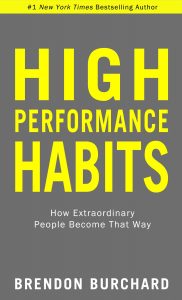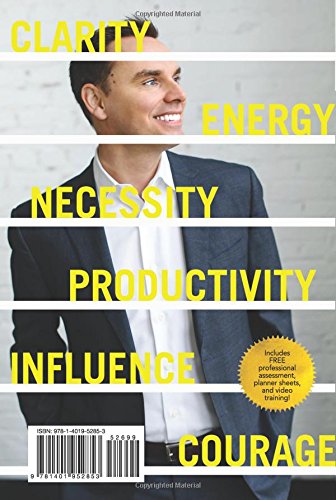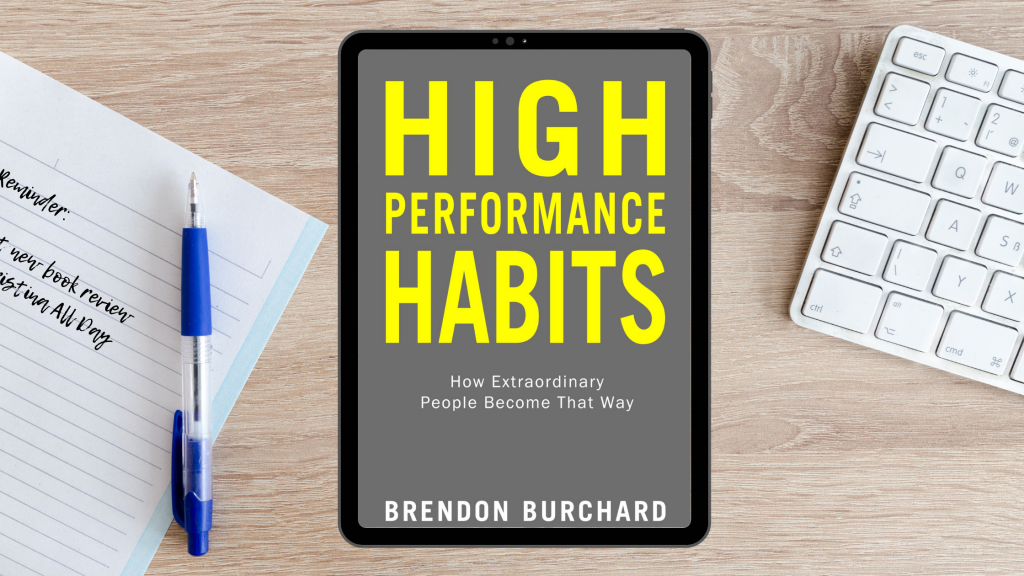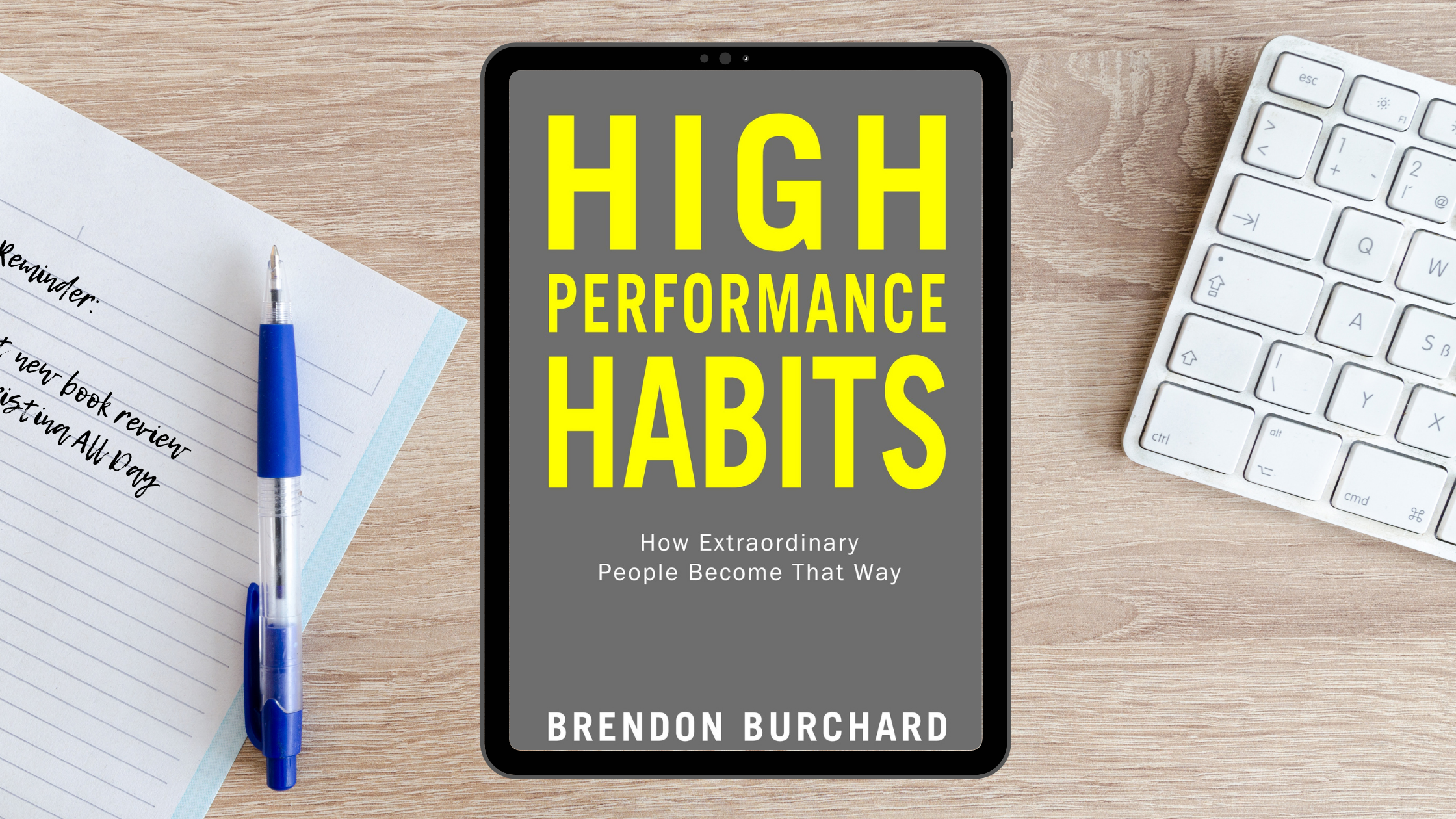Do you find that despite working hard, your combined efforts don’t seem to set you apart from the competition? Does it sometimes seem that all your time is spent on mundane tasks and answering pointless email after pointless email?
If that’s the case, then you’re not alone. Most of us are average performers, with different enegy levels and personality traits, who haven’t found a way to get off the hamster wheel of modern life. How about some life hacks?! While we dream of making it big in an exciting industry, like space investment for example, many of us feel that our goals lie beyond our reach.
High Performance Habits by Brendon Burchard Book Summary
Fortunately, High Performance Habits by author and performance coach Brendon Burchard helps make a convincing argument as to why this needn’t be the case forever. Recent research has revealed that the people who perform at the highest level, weren’t born with some sort of innate talent. Nor does the success of these high performers come down to some specific facet of their personality.
Instead, Burchard argues that real success is the product of particular professional and personal habits. His research on high performers has yielded these six important things that we can all adоpt, to bring us closer to enjoying genuine success long term:
-
Seek clarity
-
Generate energy
-
Raise necessity
-
Increase productivity
-
Develop influence
-
Demonstrate courage
We’ll look at these ideas and how he’s come to them from research that bridges to attitudes of professional athletes, to influencial leaders, and CEOs, how to master the power of emails, and how your mother could have an unlikely role to play in your success.
But first, what’s the book about?
High Performance Habits Book Summary

Twenty years ago, author Brendon Burchard became obsessed with answering three questions:
1. Why do some individuals and teams succeed more quickly than others and sustain that success over the long term?
2. Of those who pull it off, why are some miserable and others consistently happy on their journey?
3. What motivates people to reach for higher levels of success in the first place, and what practices help them improve the most
After extensive original research and a decade as the world’s leading high performance coach, Burchard found the answers. It turns out that just six deliberate habits give you the edge. Anyone can practice these habits and, when they do, extraordinary things happen in their lives, relationships, and careers.
Which habits can help you achieve long-term success and vibrant well-being no matter your age, career, strengths, or personality? To become a high performer, you must seek clarity, generate energy, raise necessity, increase productivity, develop influence, and demonstrate courage. The art and science of how to do all this is what this book is about.
Whether you want to get more done, lead others better, develop skills faster, or dramatically increase your sense of joy and confidence, the habits in this book will help you achieve it faster. Each of the six habits is illustrated by powerful vignettes, cutting-edge science, thought-provoking exercises, and real-world daily practices you can implement right now.
If you’ve ever wanted a science-backed, heart-centered plan to living a better quality of life, it’s in your hands. Best of all, you can measure your progress. A link to a free professional assessment is included in the book.
High Performance Habits Insight #1: Habits and Confidence are the Keys to Success

We’ve all met people who seem to achieve at a high level without appearing to break a sweat, and everything they touch seems to get a boost of positive emotions just by proximity to their aura. These are the people Burchard designates as high performers.
He’s conducted huge amounts of research on people from over 190 countries to try and find the formula for making a high performer. He argues that identity differences like race, gender, age, and personality archetypes are superficial factors. Rather, it’s critical habits that make you a high performer, and that what you do matters much more than who you are.
He also argues that these habits are not things we are born with or nurture unconsciously; they are goals that high performers actively nurture in their lives. It’s these key habits that allow me to get the best of tricky challenges and take the first step when it comes to acing a new project and doing good work. It’s also why they seem to pick up new skills faster than the rest of us.
So how do high performers get this confidence? They earn it through diligently applying these habits to every area of their lives. Obviously, that’s a win for the rest of us, since Burchard argues we all have the capacity to become high performers if we take the necessary action.
Constant practice brings knowledge and expertise which in turn feeds confidence so that we grow exponentially in our personal and professional lives. It’s this loop of self-development and continuous growth that is the key ingredient in high performance and generating positive outcomes.
High Performance Habits Insight #2: Purpose and Awareness Fuel High Performers
High performers, Burchard argues, are not afraid to ask themselves what they want from life, and then they go and get it. This process of ideation is a habit the author refers to as “seeking clarity”, and it helps high performers keep positive outcomes in the center of their minds.
It helps them put all their actions in the context of achieving these goals, which keeps them motivated and makes them more resilient in the face of defeat. By contrast, a lack of clarity can undermine our spirit and make us lose sight of our goals.
Clarity can be achieved and maintained in four crucial respects:
-
Self-awareness
High performers know who they are, and this insight lets them focus on exactly who they want to become. This could mean being professionally successful, but it could also mean nurturing personal qualities like kindness or humility.
-
Social sphere
High performers rarely rely on autopilot to get them through social interactions. Instead, they learn to look at how they can have a positive impact on other people during a business conference or a work lunch.
-
Skills
High performers can focus on developing the skill sets that they need to successfully accomplish their goals. They’re better at time management and can make time to improve themselves. They’re also hungry for new information that gives them an edge over their more complacent colleagues.
-
Service
Many high performers don’t just want to create a positive difference in their own lives; they also want to contribute to the success of others. It validates their hard work and produces a sense of accomplishment. Most of all, they also relish the feeling of being needed and having people depend on them, running towards responsibility instead of away from it.

High Performance Habits Insight #3: High Performers Stay Positive with Mental and Physical Fitness
Look around your boardroom of a top company, and you’re unlikely to see any of the boardroom high performers out of shape. Despite their busy schedules, these professionals are often rigorous about making time to maintain their high standards of physical fitness that play a big part in the “generating energy” argument in Burchard’s book.
Studies show that exercise has very positive effects on brain functions like memory and learning, whilst helping to reduce stress and boost mood. While many of us are tempted to dodge our workouts, high performers stick at it to reach their goals, giving themselves the energy and confidence to prosper in their professional lives in a positive way.
Despite the burden of their different responsibilities, high performers can focus on having a positive attitude where the rest of us might get easily disheartened by negative emotions. By focusing on positive thoughts and the right habits, perhaps they make it more likely that their goals will come true.
High Performance Habits Insight #4: High Performers Draw Motivation From Inside and Out
On February 11th, 1990, two boxers were due to face off for a fight. One was Mike Tyson, the most feared and decorated heavyweight champion of his era with an unbroken fight record. The other was Buster Douglas, a journeyman fighter who came into the match as the no chance underdog.
The night before the match, Tyson was out partying all night with his showbiz friends, while Douglas continued to mourn the passing of his mother, who died less than a month before the fight. Come the day, Douglas took Tyson apart with nerve and precision to cause the biggest upset in the history of the heavyweight division.
Why did Douglas, a fighter who had no chance on paper, manage to ultimately prevail against Iron Mike?
If Burchard is to be believed, it’s because he was under the influence of the third high performer habit that the author identifies as “raising necessity”. Fighting for the memory of his deceased mother sharpened Douglas’s resolve and focused his abilities to motivate him to do the impossible. His motivations were much stronger than those we can imagine of Tyson, who probably wanted to enjoy further adulation in front of fans before he could make major moves to arrive at a bigger paycheck somewhere else.
Click here to buy High Performance Habits on Amazon

The lesson here is that the quality of your motivation can have a huge effect on your performance. It’s no coincidence that marathon runners participate to raise money for a charity close to their hearts, which certainly helps them keep going when their legs are screaming at them to stop. That’s inside motivation, but by getting friends and family to sponsor their marathon, these people are also getting their motivation franked by the eyes of others. They will want to keep going so they don’t let their loved ones down.
It’s also why people look at high performers as role models so often. When you set a goal, tell people about it to create a contract to meet the expectations of others as well as yourself. With inner and outer motivation, you always dig deeper to reach your objectives through effective habits.
High Performance Habits Insight #5: High Performers Manage Time and Shut Out Distractions
There’s nothing worse than constantly being busy with nothing to show for it. This brings us to Burchard’s fourth important habit “increasing productivity”, which is the ability to separate important work from less significant drudgery.
Underperformers often get their attention bogged down by short-term duties that don’t amount to much in the long run. They are more likely to spend time sending emails about how to complete a task than they are on actually getting the task done. They’re also more likely to get behind their deadlines and leave things to the last minute. High performers, on the other hand, are master organizers. Such people keep their eyes set on the finish line and can maintain their own momentum.
If you’d like to cultivate this habit, use the proven productivity systems like the Eisenhower Matrix to help your workflow become more efficient. You can use this to make sure that you’re always doing short-term work that helps contribute to your long-term success.
High Performance Habits Insight #6: High Performers are Sensitive to the Needs of Others
There’s a pervasive image of entrepreneurs and successful people as lone wolves who single-handedly carved out their victories. Ask any of these high performers, though, and they will point you to a laundry list of extraordinary people who helped them reach the top. It’s a giving mindset with new people or a peer group.
High performers have the ability to create meaningful connections with other people that they can leverage for mutually beneficial results. They also know how to support and lead others to help their friends and colleagues get the best out of themselves.
It’s a mindset built on generosity, whether it be with time, resources, or words of kindness. They are acutely aware of what other people need to succeed and are prepared to push when they need encouragement or back off to give them the freedom to prevail. Conversely, they are also adept at asking others for help and aren’t discouraged when they face rejection.

High Performance Habits Insight #7: High Performers Aren’t Afraid to Take Risks
High performers don’t enjoy being in their comfort zone. They like to take the risks that others won’t, and that’s why they often find themselves in receipt of the biggest rewards. Burchard refers to this habit as “demonstrating courage” and ties in closely with high performers’ resilience in the face of challenges.
He stresses that these qualities aren’t inherent; they have to be developed over time as they learn from their mistakes and develop a thick skin. It’s not that high performers aren’t aware of the risks they take; it’s more that they’ve become experienced at mastering their own fears, and many have come to relish the thrill of going against the odds.
Most of us are naturally averse to struggle and difficulty, but high performers welcome challenges with a grin and know that by overcoming them, they can grow as people. This is also why they are often frank and vocal about their ambitions with other people and unafraid to be seen taking on big obstacles.
Conclusion: There’s a High Performer Hiding in All of Us
The main thing to take away from High Performance Habits is that these qualities can be actively nurtured in any of us if we’re prepared to put the work in. Like a sword, high performers are prepared to temper their metal and sharpen themselves by attacking difficult problems head-on.
They also realize that being successful is a holistic process that encompasses the people around them and the way they live their lives. Burchard has no trouble supporting his arguments with real-world examples to show how different people from all walks of life have used these habits to accomplish extraordinary things.
While his argument can tend to gloss over the role of inherited circumstances in dictating success, the ultimate message of the book is that we can all become extraordinary people if we’re willing to commit to nurturing these habits. Look at a public figure, a role model, or other top performers for personal development inspiration.
Do you agree with Burchard’s positive outlook on living a better quality of life? Or maybe you have your own specific set of practices that have brought you success? Let us know in the comments section below.
Author’s Bio:
Emily Moore is an English & programming teacher with a passion for space and blogging. She believes that current exploration should be focused on preserving our planet’s resources. With satellites circling the orbit, it is easier to get relevant data on any environmental changes. This, in turn, should help people quickly address any challenges.
